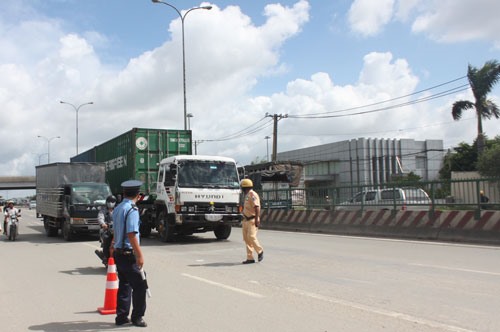 Society
Society

Transportation companies say there are suffering significant losses because of a new rule that requires original documents of vehicles to be presented on demand by traffic police.
 |
| Transportation companies say there are suffering significant losses because of a new rule that requires original documents of vehicles to be presented on demand by traffic police.– Photo vetnambiz.vn |
HÀ NỘI – Transportation companies say there are suffering significant losses because of a new rule that requires original documents of vehicles to be presented on demand by traffic police.
Individual vehicle owners, especially those who have taken loans against their vehicles, are also worried about the new rule.
The Traffic Police Department under the Ministry of Public Security recently asked police to impose fines or seize vehicles if their drivers or owners are unable to present original documents.
Previously, the State Bank of Việt Nam had issued a document (No. 3851) asking credit institutions to allow their clients to keep the original of their collateral assets when the loan agreements are still active, but this remains largely on paper.
Most bank clients have to deposit the original documents of their vehicles with the institutions for getting loans.
Nguyễn Tuấn Quang, a resident of Ba Đình District in Hà Nội, said he was paying for his four-seat car in installments, and the bank that loaned him the money keeps the vehicle’s original documents.
Quang said that traffic police used to accept a copy of his car’s documents, but recently, many of his friends have been asked for the original.
Normal practice
Vũ Quốc Huy, director of Ba Sao Taxi in Hà Nội, said 11 taxis of his company had been seized by transport police because the drivers couldn’t provide the original documents.
“When I asked the bank, they said it is normal, long-standing practice for banks to keep the original documents. The police, meanwhile, said they were only following the recent rule,” Huy said.
Đỗ Hoàng Tuấn, representative of another transport company in Quảng Ninh Province said his company suffered huge losses because of these conflicting regulations.
“Eighteen vans of the company are being held by the police, and the bank has said it would take up to three weeks to return the original documents. We have lost hundreds of millions of đồng already,” he said.
A director of the legal department of a joint-stock bank in Hà Nội said the banks’ branches are also confused about handling this issue.
“Banks can’t give out huge loans without taking in the original documents of the collateral asset. We’re still waiting for instructions from the State Bank on this matter,” he said.
Nguyễn Văn Thanh, Chairman of the Việt Nam Transport Association, said he was opposed to the new regulation.
“Drivers have long been keeping the notarized copies of vehicles’ documents to present to the police when needed, why should this change?
“The State Bank and the Ministry of Public Security should quickly come to a consensus on this matter so that transportation companies don’t suffer huge losses because of these conflicting regulations,” he said.
Lawyer Trần Công Trục of Hà Nội said that according to the Law on Notarization, the notarized documents have the same value as the original ones, so it’s not right for transport police to fine drivers who are able to present the notarized documents of their vehicles.
Lawyer Trương Thanh Đức from the Việt Nam International Arbitration Center said the law should be changed.
“I think it’s rational to let credit institutions keep the original documents of collateral assets. And the police should not fine owners who do not have original documents if they have taken loans to buy the vehicles.”
Nguyễn Hữu Dánh, deputy head of the Department of Traffic Police under the Ministry of Public Security, told the online newspaper Vnexpress that the department was only following the law.
"The department issued such a document because the State Bank has ordered all credit institutions to allow borrowers keep the original documents of the collateral assets.
“So, if vehicles owners can keep the original documents, they will be fined by traffic police if they can’t present them," he said.
Dánh added: "This is not a new regulation. It was regulated earlier in Decreee 163/2006, and amended in 2012. Most people do not understand their rights when borrowing money from banks, so they accept that banks will keep their documents." --VNS




